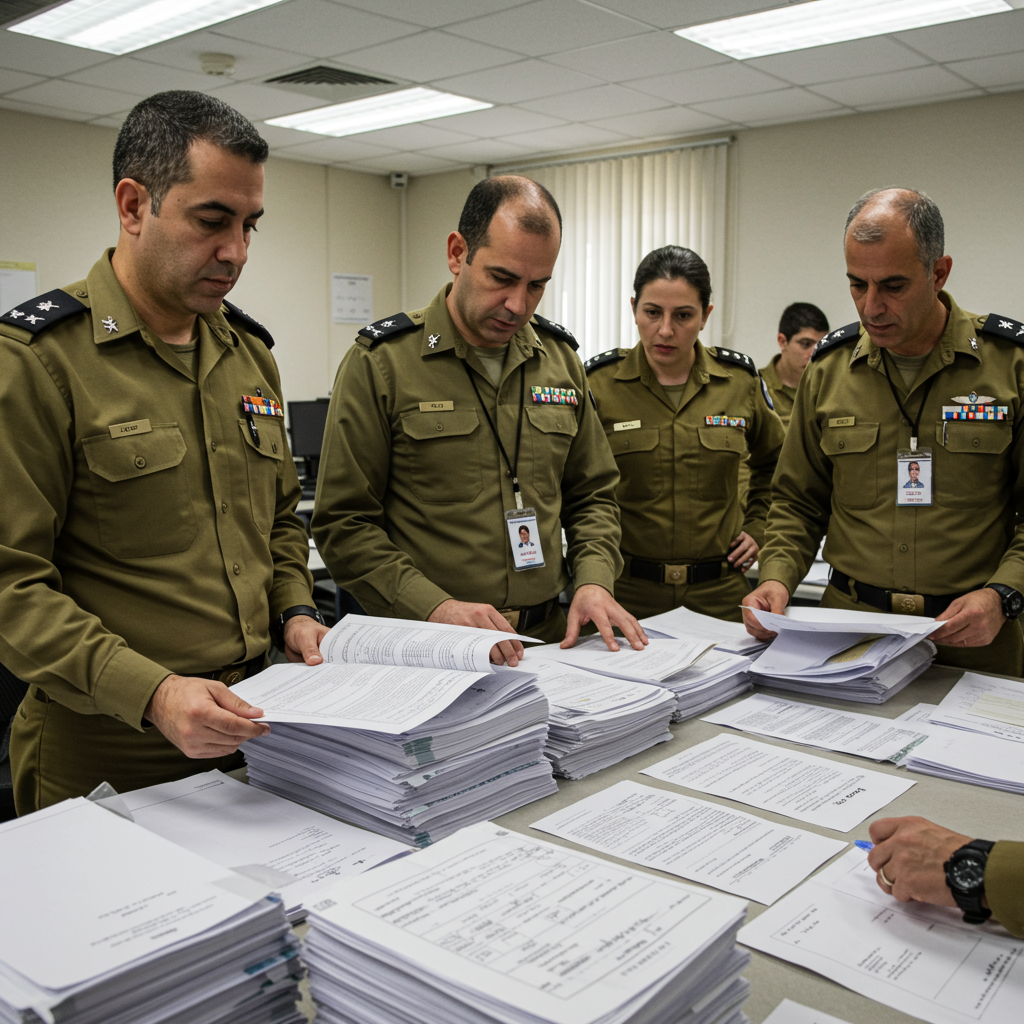The Israeli military is launching an investigation into potential war crimes stemming from disturbing reports that its forces may have deliberately fired upon Palestinian civilians seeking humanitarian aid in Gaza. This urgent probe, ordered by the Military Advocate General, follows detailed allegations published in the Israeli newspaper Haaretz.
According to the Haaretz report, which cited accounts from unnamed Israeli soldiers, troops allegedly received orders to shoot at crowds of Palestinians gathering near aid distribution points. The stated purpose of these alleged orders was to keep the crowds back from military positions, raising concerns among the soldiers themselves about using potentially unnecessary lethal force against individuals who seemed unarmed and posed no direct threat. The newspaper stated that an IDF unit specifically tasked with reviewing incidents that might involve breaches of international law has been assigned to examine soldiers’ actions in these aid areas over the past month.
The Israeli military has vehemently denied the specific allegation that soldiers were deliberately instructed to shoot civilians. The Israel Defense Forces (IDF) stated that its directives strictly prohibit intentional attacks on civilians, including those approaching aid sites. While rejecting the report’s core claim of specific firing orders, the IDF did confirm it is investigating incidents where civilians were harmed while approaching aid locations. The military also noted it is actively working to improve “operational response” in these volatile areas, citing recent measures like installing new fencing and signs, and opening additional routes to aid handout zones. Israeli Prime Minister Benjamin Netanyahu and Defense Minister Israel Katz strongly condemned the Haaretz report, dismissing its findings as “malicious falsehoods designed to defame” the IDF, which they characterized as highly moral.
Hundreds Killed Near Aid Distribution Points
The investigation comes amid mounting reports of violence and significant casualties among Palestinians desperate for food and basic supplies in the nearly two-year-old conflict zone. According to Gaza’s Health Ministry and local officials, hundreds of Palestinians have tragically lost their lives over the past month alone in the vicinity of areas where aid distribution was occurring. The ministry reports that over 500 people have been killed and hundreds more wounded while attempting to access food, particularly near sites operated by the US-backed Gaza Humanitarian Foundation (GHF) or routes used by UN aid trucks.
Witnesses on the ground paint a grim picture of the chaos and danger involved in seeking aid. Palestinians describe facing gunfire and shelling on roads leading to distribution sites. One displaced man from Rafah recounted being shot at for hours while simply trying to access food, witnessing numerous casualties around him. Medical organizations like Doctors Without Borders (MSF) have also reported treating a surge in patients with gunshot wounds sustained while trying to obtain aid. MSF noted a disturbing 190% increase in bullet wound cases at one of their field hospitals following the opening of a nearby GHF site.
Aid System Condemned as ‘Slaughter’
The severe food shortage in Gaza is exacerbated by significant obstacles to aid delivery, including damaged infrastructure, ongoing Israeli restrictions, military operations, and widespread looting. The traditional UN-coordinated aid system, which Israel has often accused Hamas of diverting (a charge denied by aid groups), has been severely hampered. A new system involving the GHF, a US-backed private contractor, began operating about a month ago, distributing food boxes primarily in southern Gaza. However, access to GHF sites, which often open unpredictably and sometimes at night, requires traversing highly dangerous areas.
Aid organizations have harshly criticized the current distribution mechanisms, particularly the GHF-led effort. MSF labelled it “a slaughter masquerading as humanitarian aid” and demanded its immediate shutdown. The organization stated the system degrades Palestinians, forcing them to risk their lives for meager supplies. MSF, along with the UN and other major aid groups, have reportedly refused to cooperate with the GHF, citing concerns about its neutrality and perceived alignment with Israeli military control.
UN Secretary-General António Guterres delivered a scathing assessment, describing the US-backed operation as “inherently unsafe” and declaring plainly, “It is killing people.” He stressed that “The search for food must never be a death sentence” and called the situation where essential supplies are inaccessible a potential “weaponization of food,” which could constitute a war crime. Guterres urged Israel to lift restrictions on aid and called for a return to the established UN distribution system, which he said has been “strangled” by military operations, leading to a humanitarian crisis of “horrific proportions.” While the GHF spokesperson stated they were “not aware of any of these incidents” at or immediately near their specific sites and that no fatalities had occurred there, they acknowledged the gravity of the allegations and called for an investigation with transparent results.
Specific Incidents Under Scrutiny
Beyond the general pattern of violence near aid zones, specific incidents have drawn particular attention and are likely to be part of the ongoing investigations. For instance, medical officials reported that the bodies of eight people who died on Friday from a GHF site in Netzarim were brought to Shifa Hospital, though the exact cause of death was unclear.
Another widely reported incident involved an Israeli strike in Deir Al-Balah where Palestinian police were distributing flour. Medical officials reported that the strike killed 18 people, including members of a police unit tasked with preventing looting, alongside civilians who had gathered for aid. Witnesses described a scene of horror with torn bodies. This strike occurred shortly after Israel restricted crossings into northern Gaza, where needs are most acute.
The IDF’s internal review process has faced criticism in the past from human rights groups, who argue that few investigations are thoroughly pursued and result in minimal accountability or sanctions for alleged misconduct. The current probe is tasked with examining actions over the past month, a period correlating with the high number of deaths reported near aid distribution points.
The violence around aid distribution sites underscores the dire humanitarian situation in Gaza, where an estimated two million inhabitants face acute shortages of food, water, and medicine. This crisis is a direct consequence of the extensive military campaign launched by Israel following the Hamas attack on October 7, 2023, which killed nearly 1,200 people in Israel. According to Gaza health authorities, Israel’s response has resulted in the deaths of over 56,000 Palestinians, with women and children comprising more than half of the fatalities. Israel maintains it targets militants and attributes civilian deaths to Hamas operating in densely populated areas. The outcome of the military’s probe into the aid shootings remains uncertain as the humanitarian catastrophe continues to unfold.
Frequently Asked Questions
What triggered the Israeli military’s investigation into Gaza aid shootings?
The investigation was prompted by a report in the Israeli newspaper Haaretz, which cited unnamed Israeli soldiers claiming they were ordered to fire on Palestinian civilians near aid distribution sites. This report alleged unnecessary lethal force was used against people seeking food.
What dangers do Palestinians face when seeking aid in Gaza, according to reports?
Palestinians seeking aid reportedly face significant dangers, including gunfire and shelling on roads leading to distribution points. Witnesses describe being shot at while trying to access food. Aid groups report treating numerous bullet wound injuries sustained in these dangerous areas, particularly near sites involved in the new aid distribution system.
How have UN and aid groups like MSF responded to the current aid distribution situation in Gaza?
Organizations like Doctors Without Borders (MSF) and the United Nations have heavily criticized the current aid system, especially the US-backed Gaza Humanitarian Foundation (GHF) operation. MSF called it a “slaughter” and “inherently unsafe,” with the UN Secretary-General stating it is “killing people.” These groups have urged Israel to lift restrictions, facilitate aid access, and return to the established UN distribution system, which they argue is safer and more effective.
Word Count Check: 989



